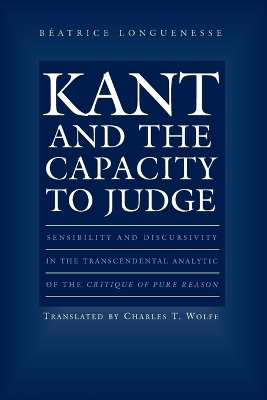
Kant and the Capacity to Judge
Princeton University Press (Verlag)
978-0-691-07451-1 (ISBN)
Kant claims to have established his table of categories or "pure concepts of the understanding" according to the "guiding thread" provided by logical forms of judgment. By drawing extensively on Kant's logical writings, Beatrice Longuenesse analyzes this controversial claim, and then follows the thread through its continuation in the transcendental deduction of the categories, the transcendental schemata, and the principles of pure understanding. The result is a systematic, persuasive new interpretation of the Critique of Pure Reason. Longuenesse shows that although Kant adopts his inventory of the forms of judgment from logic textbooks of his time, he is nevertheless original in selecting just those forms he holds to be indispensable to our ability to relate representations to objects. Kant gives formal representation to this relation between conceptual thought and its objects by introducing the term "x" into his analysis of logical forms to stand for the object that is "thought under" the concepts that are combined in judgment.
This "x" plays no role in Kant's forms of logical inference, but instead plays a role in clarifying the relation between logical forms (forms of concept subordination) and combinations ("syntheses") of perceptual data, necessary for empirical cognition. Considering Kant's logical forms of judgment thus helps illuminate crucial aspects of the Transcendental Analytic as a whole, while revealing the systematic unity between Kant's theory of judgment in the first Critique and his analysis of "merely reflective" (aesthetic and teleological) judgments in the third Critique.
Beatrice Longuenesse is Professor of Philosophy at Princeton University. Her other books include Hegel et la Critique de la Metaphysique.
AcknowledgmentsNote on Sources and AbbreviationsIntroduction3Ch. 1Synthesis and Judgment17Ch. 2The "Threefold Synthesis" and the Mathematical Model35Ch. 3The Transition to Judgment59Ch. 4Logical Definitions of Judgment81Ch. 5How Discursive Understanding Comes to the Sensible Given: Comparison of Representations and Judgment107Ch. 6Concepts of Comparison, Forms of Judgment, Concept Formation131Ch. 7Judgments of Perception and Judgments of Experience167Ch. 8Synthesis Speciosa and Forms of Sensibility211Ch. 9The Primacy of Quantitative Syntheses243Ch. 10The Real as Appearance: Imagination and Sensation292Ch. 11The Constitution of Experience324Conclusion: The Capacity to Judge and "Ontology as Immanent Thinking"394Bibliography401Index409Index of Citations of Kant's Works415
| Erscheint lt. Verlag | 23.1.2001 |
|---|---|
| Zusatzinfo | 2 line illus. |
| Verlagsort | New Jersey |
| Sprache | englisch |
| Maße | 152 x 235 mm |
| Gewicht | 652 g |
| Themenwelt | Geisteswissenschaften ► Philosophie ► Erkenntnistheorie / Wissenschaftstheorie |
| Geisteswissenschaften ► Philosophie ► Logik | |
| ISBN-10 | 0-691-07451-8 / 0691074518 |
| ISBN-13 | 978-0-691-07451-1 / 9780691074511 |
| Zustand | Neuware |
| Haben Sie eine Frage zum Produkt? |
aus dem Bereich


![Was heißt Denken?. Vorlesung Wintersemester 1951/52. [Was bedeutet das alles?] - Martin Heidegger](/media/113619842)